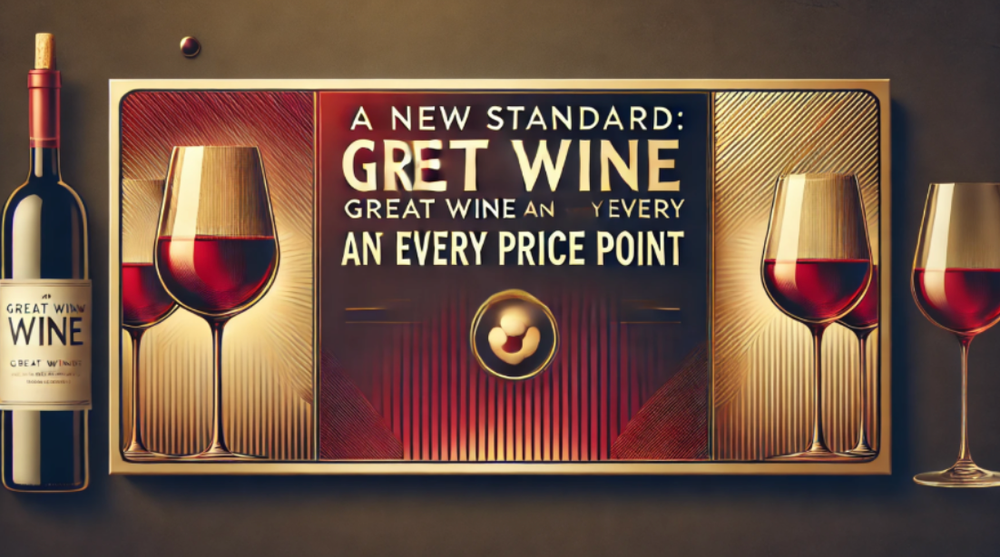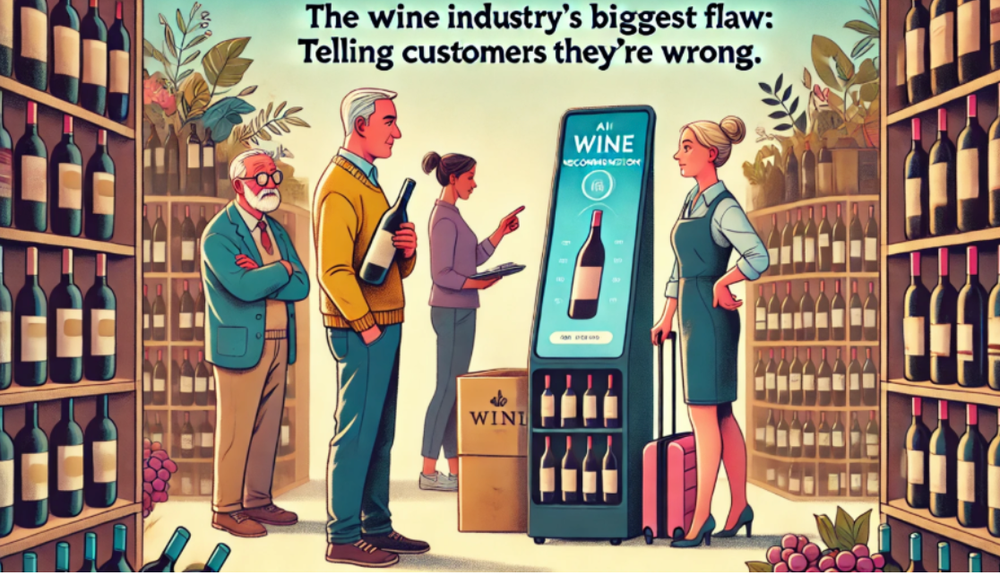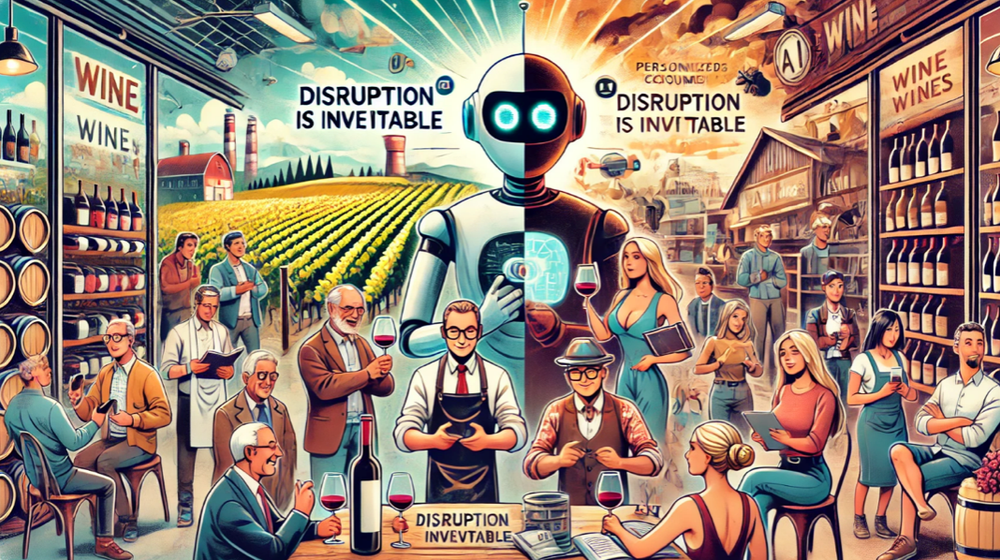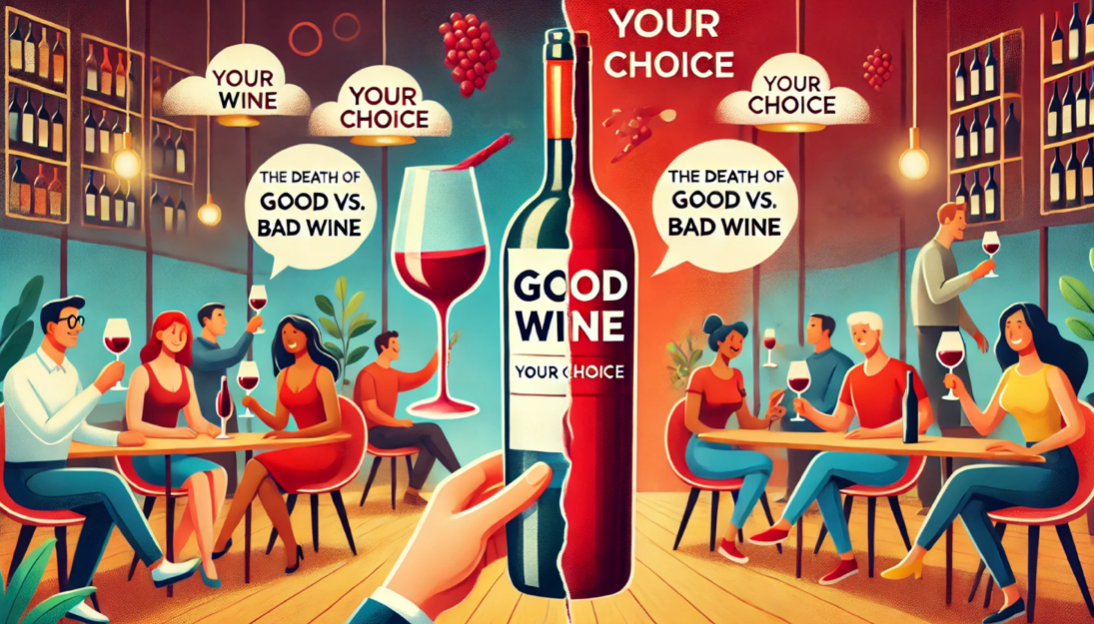Imagine a future where the concept of "correct" wine no longer exists, replaced by a culture that embraces individual experiences and choices. Instead of trying to fit everyone into a pre-defined mould, we could leverage technology, like a global sensory insights database, to truly democratise wine discovery.
Such a database could function much like music streaming platforms curate playlists—tailored recommendations based on a consumer's unique palate and drinking history.
The negative effects of the “Good vs. Bad” wine paradigm
The concept of “good” vs. “bad” wine has been one of the most damaging narratives in the industry. It has fostered elitism, alienated potential consumers, and stifled creativity.
Alienating new audiences
By perpetuating the myth that certain wines are inherently “better,” the industry has discouraged many people from exploring wine at all. Newcomers often feel intimidated, fearing they will make the “wrong” choice or be judged for their preferences.
Creating a culture of judgment
This binary approach breeds snobbery, leading to interactions that alienate consumers. How many times have we heard someone say, “You just need to grow up,” or “You’ll understand quality wine one day”? This kind of attitude doesn’t just harm individuals, it damages the industry’s reputation as a whole.
Ignoring consumer evolution
Taste is personal and evolves over time. Clinging to rigid definitions of “good” and “bad” fails to acknowledge this natural progression. It also ignores the reality that many consumers may never desire “complex” or “prestigious” wines and that’s okay.
Devaluing affordable wines
The industry often diminishes the value of affordable wines, suggesting they are lesser simply because of their price point. This ignores the fact that many well-made, affordable wines bring immense joy to millions of people every day.
Stifling Innovation
The “good vs. bad” mindset prioritises tradition over experimentation. This limits the industry's ability to innovate, adapt to changing consumer preferences, and explore new styles and methods of winemaking.
A new standard: great wine at every price point

Instead of focusing on whether a wine is “good” or “bad,” the industry should commit to a single principle: everything we offer, regardless of price point, should be great.
What does “great” mean? It means delivering value and quality that align with the price. A $10 wine can be just as “great” as a $100 wine if it meets the expectations of its target audience.
This shift requires us to #rethink how we define and communicate quality. It’s not about achieving some arbitrary standard set by critics or tradition. It’s about creating wines that resonate with consumers and provide genuine enjoyment.
The role of AI in transforming wine recommendations
Artificial intelligence has the power to revolutionise how people find wines they will love. Instead of relying on the subjective opinions of salespeople, critics, or even well-meaning friends, customers could receive personalised, data-driven suggestions that align with their tastes.
The role of the wine salesperson, too, could evolve. Instead of being gatekeepers of knowledge, they can become guides, introducing customers to tools, services, and AI systems that enhance the buying experience. They wouldn’t need to tell someone what they “should” enjoy but instead help them explore their options in a judgment-free way.
And to those who worry that AI-driven personalisation might restrict consumers to what they already know: that’s simply not true. Humans naturally evolve in their preferences over time. I’m living proof of that. I once enjoyed wine mixed with condensed milk (yes, really). Over the years, my palate has shifted to bubbly wines, heavy reds, and now, almost exclusively light reds.
Tastes evolve, but they do so organically. We don’t need to force it. And for those whose preferences remain consistent, that’s perfectly fine too.
Why we must respect consumer choices

The traditional wine industry narrative insists that consumers must be "educated" to appreciate wine. But isn’t that perspective inherently flawed? It assumes there’s a right way to enjoy wine - a hierarchy of taste that elevates some preferences while looking down on others. Why not meet people where they are? Respect their choices instead of trying to change them.
At the core of this shift is a fundamental question: why do we sell one product by tearing down another? Instead of arguing over “good” and “bad” wine, why can’t we focus on what truly matters, connecting consumers with wines they love, whatever those may be?
The wine industry’s biggest flaw: telling customers they are wrong
No other industry tells its customers they are wrong. Yet, in wine, this happens all the time. I saw it first-hand during my time in Germany last year at ProWein where the whole hotel was full of people from the wine industry.
My client and I were discussing modern consumer behaviour when we asked a young hotel waiter if he drank wine. His answer was refreshingly honest:
“Yes, sometimes with my friends in the afternoon. My uncle gives me a case of expensive wines every month, but I don’t like them. I much prefer the cheaper ones.”
Before I could respond, a nearby man who works in the wine industry stood up and commented: “Why are you drinking cheaper wines if you can drink the expensive ones your uncle gives you? It doesn’t make sense.”
The poor waiter nervously explained: “Maybe my palate will mature with time,” to which the man replied, “Yes, you need to grow up.”
This attitude is exactly why the wine industry is struggling. Why can’t we respect others’ decisions? Why must we impose our own beliefs about what’s “good” onto others? It’s hypocritical.
No one I know started their wine journey drinking Barolo or Grand Cru Burgundy. Taste is personal, and expensive wines are often an acquired taste. Instead of judging, we should celebrate that young people are drinking wine at all.
Building a new culture of respect

The future of wine is not about "good" vs. "bad." It’s about connection, personalisation, and respect. We need to stop gatekeeping and start fostering an environment where people feel safe to enjoy what they like, without fear of judgment.
Imagine a world where every wine interaction - whether in a store, a restaurant, or a winery - begins with a simple question: “What do you enjoy?”
No snobbery. No condescension. Just curiosity and a desire to help.
Disruption Is inevitable
AI is already challenging traditional paradigms. It won’t just change how we buy wine; it will force us to rethink our entire approach to wine culture. The question isn’t whether the industry will change, it’s whether we’ll adapt quickly enough to keep up.
For those clinging to old narratives, I have one piece of advice: humility. The industry’s future lies in respecting consumers, not dictating to them. It’s time to embrace this change and become the best versions of ourselves, as professionals and as human beings.
Let’s end on a positive note
The story I shared above isn’t just a criticism - it’s a call to action. Let’s leave the judgment behind and start sharing stories of positive change in the wine industry. Tag the people who are doing it right. Let’s celebrate them.
Because at the end of the day, wine is about enjoyment. And there’s no “wrong” way to enjoy it.
* Priscilla Hennekam has been able to "unite" over 10,000 people from 65+ countries, since February 2024, under the banner of Rethinking the Wine Industry (RWI) - a global movement dedicated to transforming the world of wine.
She says: "The RWI community is built on a bold mission: to cultivate a wine industry driven by thinkers, not followers; innovators, not imitators. Together, the community aims to rewrite the narrative and pave the way for a more inclusive, sustainable, and forward-thinking future."
In 2025 she will officially launch the Rethinking the Wine Industry platform. She adds: "If you’re passionate about shaping the future of wine, this is your opportunity to join a groundbreaking movement. Whether you want to be part of the launch or sponsor an initiative that challenges the status quo, visit the RWI community website: www.rethinking.wine."






























